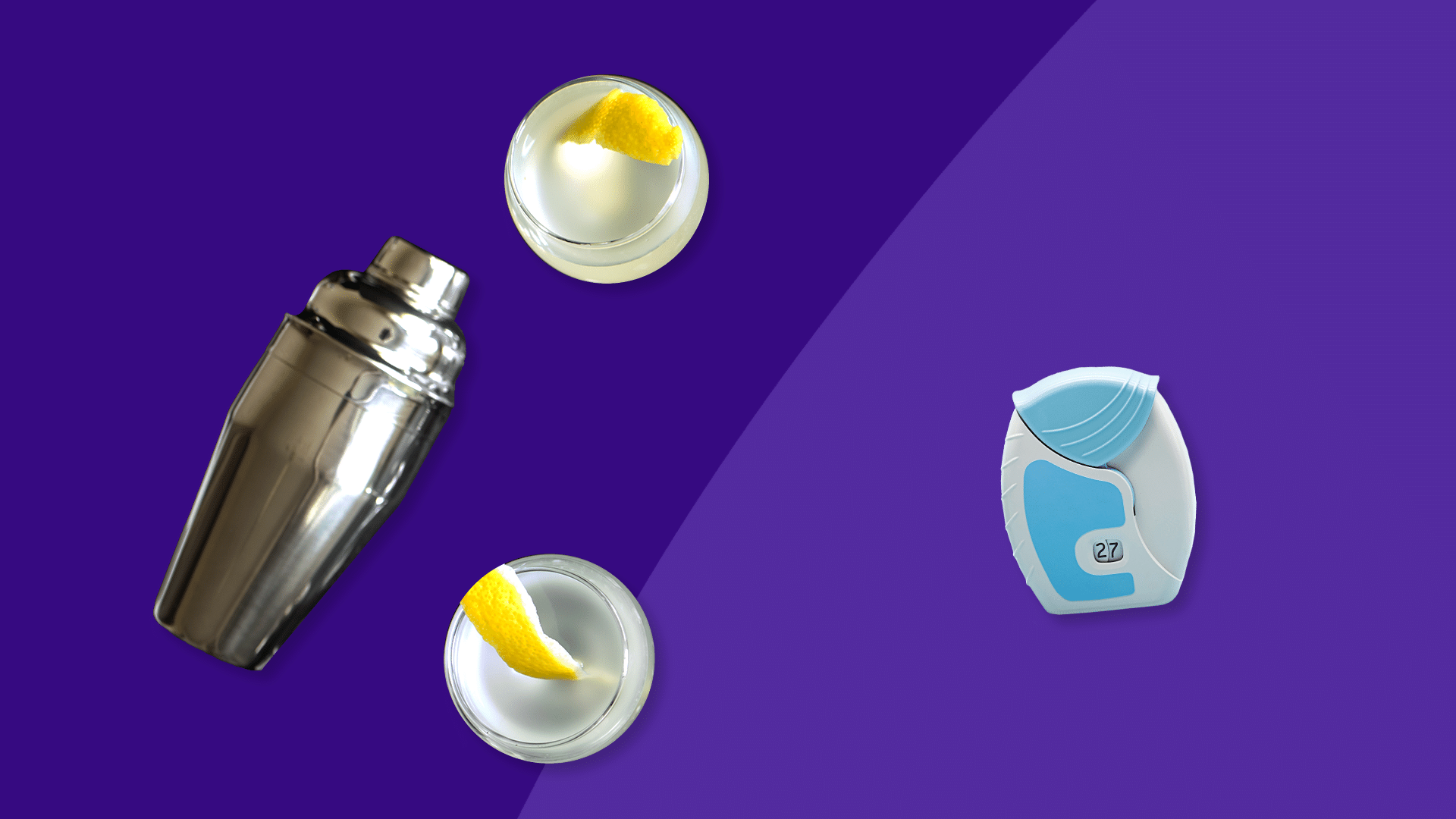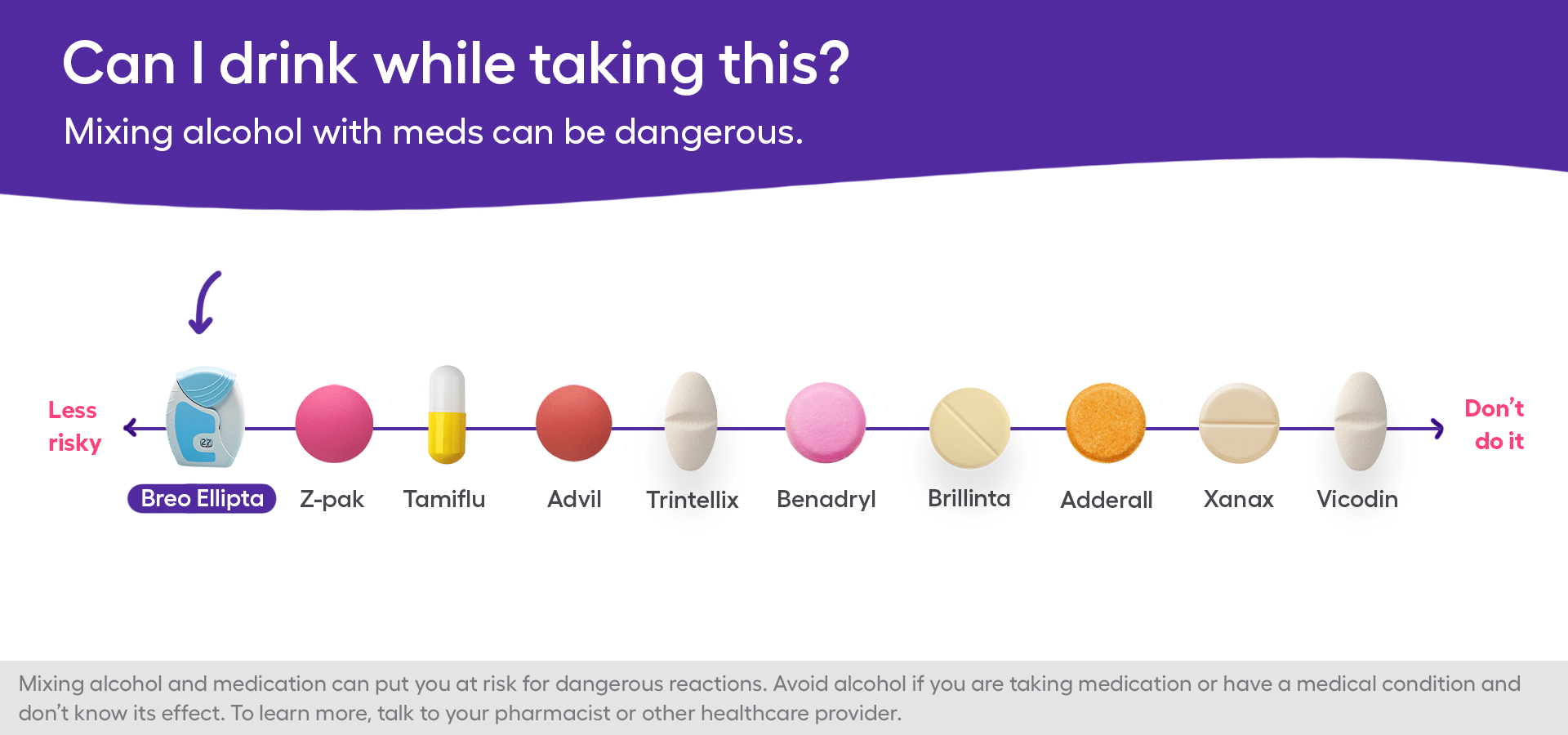If you have chronic obstructive pulmonary disease (COPD) or asthma, using your inhaler daily is a must to prevent worsening symptoms. A controller inhaler, like Breo Ellipta, is a long-term treatment that may be a part of your daily routine. But what about when you want to go for a night out with friends or family, or when you want to enjoy an alcoholic beverage? Is it safe to mix Breo Ellipta and alcohol?
According to the FDA label, there’s no mention of Breo Ellipta and alcohol interactions. So, while it could be safe, let’s dive deeper into the potential effects of mixing the two.
What is Breo Ellipta?
Breo Ellipta is a brand-name drug used for the treatment of COPD or asthma. It is used to prevent COPD or asthma attacks with daily, consistent use. It can help manage symptoms like wheezing, coughing, and shortness of breath.
Breo Ellipta contains a combination of an inhaled corticosteroid called fluticasone furoate and a long-acting beta-agonist called vilanterol. The combination of these active ingredients helps decrease inflammation and relax the smooth muscles in the airways. Relaxing these muscles helps open up the airways, making it easier to breathe.
This portable inhaler comes with two blister strips of medication powder: one containing 100 mcg or 200 mcg of fluticasone furoate and the other containing 25 mcg of vilanterol per blister. A single Breo Ellipta inhaler provides treatment for 30 days.
Can you mix Breo Ellipta and alcohol?
There is no official language from the FDA or manufacturer that says you can’t mix Breo Ellipta and alcohol. When used as prescribed, the active ingredients in Breo Ellipta are minimally absorbed into the bloodstream. After all, the main target of treatment is the lungs and airways.
Alcohol, on the other hand, is greatly absorbed into the bloodstream and processed in the liver. Because of their differences in how they are absorbed, Breo Ellipta and alcohol do not directly interact with each other. However, they may have similar effects that can overlap and lead to complications.
The most common side effects of Breo Ellipta include:
- Headache
- Runny nose
- Sore throat
- Sinus inflammation
- Respiratory tract infections
- Cough
- Oral thrush
- Back pain
- Joint pain
Increased risk of infection
Breo Ellipta contains a corticosteroid, which can suppress the immune system. When used long-term, Breo Ellipta may increase the risk of infections and worsen any existing infections. In people with COPD, Breo Ellipta may increase the risk of pneumonia.
Alcohol use can also suppress the immune system, especially when used heavily and frequently. Heavy alcohol use can lead to an increased risk of bacterial and viral infections. Alcohol can impair the function of the immune system’s white blood cells, the body’s number one defense against infections. Acute alcohol use can also suppress cytokines, which are vital for activating the immune system.
Blood pressure changes
Vilanterol, the beta-agonist part of Breo Ellipta, can have effects on the heart and blood pressure. Like other similar drugs, vilanterol can increase heart rate and blood pressure.
The American Heart Association recommends limiting alcohol consumption to prevent high blood pressure and heart problems. Drinking alcohol can have different effects on blood pressure. Studies show that alcohol can decrease blood pressure up to 12 hours after consumption and then increase blood pressure 13 hours after consumption. Large amounts of alcohol can also increase heart rate. In other words, mixing Breo Ellipta and alcohol should be cautioned in people with high blood pressure and heart issues.
Blood sugar changes
Breo Ellipta has been reported to cause increases in blood sugar levels (hyperglycemia). In contrast, drinking alcohol can stimulate a spike in insulin, which can cause blood sugar levels to drop. The use of alcohol should be cautioned in people at risk of low blood sugar levels (hypoglycemia).
The opposing actions of Breo Ellipta and alcohol can lead to unpredictable sugar levels. If you have diabetes in addition to COPD or asthma, you may need to monitor your blood sugar levels while using Breo Ellipta. You may also need to avoid drinking alcohol with Breo Ellipta.
Is Breo Ellipta hard on the liver?
Breo Ellipta does not have any direct effects on the liver. However, people with liver disease can experience increased blood levels of the corticosteroid in Breo Ellipta. This may lead to an increased risk of side effects.
People who frequently drink or abuse alcohol are at an increased risk of liver damage and liver disease. If you drink heavily, you may need to be monitored for liver problems and adjust your use of Breo Ellipta. Liver disease can increase blood levels of fluticasone furoate three-fold and increase the risk of adverse effects.
Bottom line
There are no direct interactions between alcohol and Breo Ellipta. Occasional consumption of alcohol should be fine while using Breo Ellipta as prescribed. But it’s important to check with your healthcare provider before doing so. Alcohol can also worsen symptoms of asthma or COPD, so it’s best to get medical advice. Certain people, especially those with high blood pressure, heart problems, diabetes, or liver problems, should use caution when mixing alcohol and Breo Ellipta.












